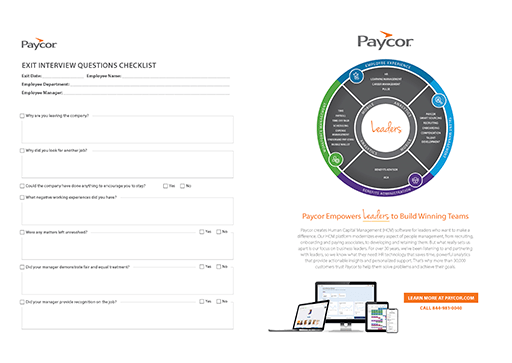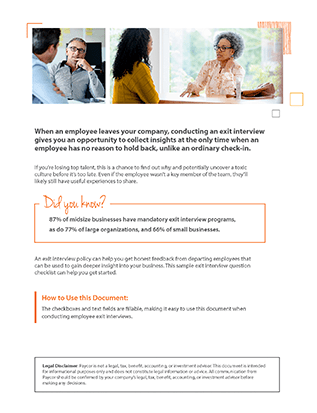Get Our Exit Interview Template
The longer an employee’s tenure, the more they help you learn about how the company really works. This means, strange as it might seem, they’ll never offer more valuable insights than on the day they leave. That’s why it’s good practice to conduct exit interviews—departing employees offer a unique perspective and may well be more candid than during their employment. Exit interviews provide a great opportunity to learn about your own organization—but only if you ask the right questions.
Capitalize on the Underutilized Practice of the Exit Interview
In the world of human resources, the focus is always on a strong start. From finding that perfect candidate to conducting a spot-on interview, it’s all about the beginning. However, strong HR practices are not just about the first phase or hiring.
Inevitably employees leave the company, which kicks off the process of wrapping things up and conducting an exit interview. For many companies, the employee exit interview is an afterthought. But the exit interview can be a powerful tool to consistently evolve and optimize company performance and culture. The exit interview is a rare opportunity to get honest and raw feedback about an organization’s effectiveness in many areas, from how closely a role matched the actual duties of a job, to how well leadership actually leads.
Why Conduct an Employee Exit Interview
When an employee leaves your company, it can be tempting to push them out the door and get their replacement in place as quickly as possible. Conducting exit interviews gives you an opportunity to collect insights at the only time when an employee has no reason to hold back, unlike an ordinary check-in. If you’re losing top talent, this is a chance to find out why and potentially uncover a toxic culture before it’s too late. Even if the employee wasn’t a key member of the team, they’ll likely still have useful experiences to share.
How to Conduct an Exit Interview
Conducting an exit interview effectively takes skill and practice. You want to create an environment where the departing employee feels comfortable offering their honest opinions. For this reason, it’s better that the interviewer is from your HR team, rather than the employee’s direct supervisor. Hold the interview somewhere private, and as close as possible to the last hour of the employee’s last day.
Reassure the employee that their answers will be confidential and that the purpose of the interview is to inform and improve company policy going forward. Take notes, and make sure that the conclusions are acted upon—without follow through, conducting an exit interview is a waste of time.
Most importantly of all, the interviewer should never be tempted to express their own opinion. This isn’t one last chance to convince an employee to stay, and it definitely isn’t the time to argue with an employee’s answers. If the departure is on unhappy terms and you’re concerned about the interview becoming heated (or if you simply can’t find time to schedule an in-person interview), offer the alternative of a written questionnaire that the employee can fill out in their own time.
Step 1: Determine the Exit Interview Format
The format of an exit interview is important. The two most common exit interview formats are in-person or questionnaire. Each format has pros and cons.
- Face-to-Face Exit Interview
The face-to-face exit interview offers some distinct benefits. You end the employment in the same way it began, with the attention of an interview that exhibits professionalism. A formal in-person exit interview also provides more three-dimensional feedback. People are often more open during conversation and the detail offered is more useful. The drawback of an in-person exit interview is that it may feel like an obligation, which could negatively color the feedback provided. Also, when feedback is given in conversation, it is harder to track so you’ll need to consider a way to record or capture the interview content for analysis later. - Questionnaire Exit Interview
The obvious benefit of a questionnaire-based exit interview is that an employee can do it on their own time. When an employee is in the final two weeks of a role, they are usually quite busy transitioning work, so this could be a more convenient option. However, a questionnaire exit interview may fall by the wayside because the employee is so busy during the final stretch. Also, in a questionnaire scenario, an employee may not feel as compelled to divulge rich, honest feedback. Plus, many people simply don’t enjoy writing long-form answers, so you run the risk of receiving one-sentence replies, with very little usable information.
Step 2: Select the Interviewer
If you decide on a face-to-face exit interview, you will need to decide on the person who will administrate the interview. Determine who will be the interviewer (manager, HR, etc.). Since the departing employee may have negative feedback about their manager that they may feel uncomfortable providing, HR is usually a better bet for these interviews to ensure full disclosure.
Step 3: Create a List of Questions & What NOT to Ask
For an effective exit interview, you will need a prepared list of questions, which will help organize the interview and save valuable time for both the interviewer and exiting employee.
Open the interview with an explanation of what an exit interview is. While the term “exit interview” is widely understood in the HR industry, many employees either won’t know what it is or understand its significance. Once you share that an interviewee’s responses will directly help the organization, this will make them feel valued and inspired to offer genuine, useful feedback.

Exit Interview Questions to Avoid
- Would you be willing to stay? At this stage it’s too late for this question.
- Which colleagues or managers were the worst to work with? While it’s important to get constructive feedback, singling out specific people in an organization is not useful. Focus on larger themes.
- Why didn’t you enjoy working here? This question is too specific and could steer the conversation into emotional territory. Instead of asking them directly why they didn’t like the organization, focusing on broader questions about ways to improve will generate better information.
Use the Exit Interview Data to Improve
Data is the hottest currency in business and exit interview feedback is a goldmine. To really capitalize on an exit interview, you should apply the principles of data analytics.
First ensure consistent data collection, which is why it’s important to conduct interviews the same way each time. This applies to how the interview is conducted (in-person vs. questionnaire) and the types of questions asked. Of course, there will be exceptions to this rule, but the more you apply consistency to your exit interviews, the better the insights can be.
Next, you should create a process for analysis. It’s not enough to collect your exit interview information. You must actually review it, find key themes, identify action items, and implement them. If you don’t have a process for exit interview feedback collection and analysis, think about leveraging your internal data experts. They likely have solid frameworks and methods you can apply.
Finally, you should take action. As insights are uncovered from exit interviews, share the information formally with stakeholders and decision-makers. For example, if you receive feedback that shows employee onboarding is not thorough enough, share this information with managers and leadership. Formulate a plan to improve onboarding materials.
Make the Exit Interview Your Secret Weapon
The HR department that puts as much thought into the hiring phase as they put into an employee’s last two weeks is at a major advantage. Unfortunately, far too many organizations sleep on the opportunity to fully-leverage this step in the human resources toolkit.
As you plan your initiatives for next quarter and next year, add a line item to analyze your current exit interview processes. A few simple tweaks could lead to measurable improvements in your company culture.











